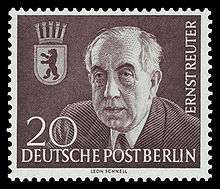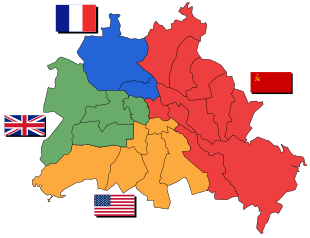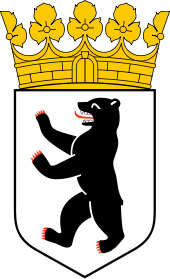Ernst Reuter
| Ernst Reuter | |
|---|---|
 Ernst Reuter on a West Berlin postage stamp from 1954. | |
| Chairman of the Volga German Autonomous Soviet Socialist Republic | |
|
In office October 1918 – March 1919 | |
| Succeeded by | Adam Reichert |
| 1st Governing Mayor of West Berlin | |
|
In office 24 June 1947 – 29 September 1953 | |
| Preceded by | Otto Ostrowski |
| Succeeded by | Walther Schreiber |
| Personal details | |
| Born |
Ernst Rudolf Johannes Reuter 29 July 1889 Apenrade, Province of Schleswig-Holstein, German Empire |
| Died |
29 September 1953 (aged 64) Berlin |
| Resting place | Waldfriedhof Zehlendorf |
| Nationality | German |
| Political party | SPD |
| Spouse(s) | Hanna Kleinert |
| Children | Edzard Reuter |
| Alma mater | Philipps-Universität Marburg |
Ernst Rudolf Johannes Reuter (29 July 1889 – 29 September 1953) was the German mayor of West Berlin from 1948 to 1953, during the time of the Cold War.
Biography
Early years
Reuter was born in Apenrade (Aabenraa), Province of Schleswig-Holstein (now in Denmark). He spent his childhood days in Leer where a public square is named after him. Reuter attended the universities of Münster and Marburg where he completed his studies in 1912 and passed the examinations as a teacher. Moreover, he was member in a fraternity called "SBV Frankonia Marburg". The same year he became a member of the Social Democratic Party of Germany (SPD).
Reuter opposed Kaiser Wilhelm's regime at the start of the First World War. After getting drafted, Reuter was wounded and captured by Russians during the Bolshevik Revolution. In captivity, Reuter joined the Bolsheviks and organized his fellow prisoners into a soviet. In 1917, Lenin sent him to Saratov in the to-be-established Volga German Autonomous Soviet Socialist Republic.[1]
Weimar Republic
Upon his return to Germany, Reuter joined the Communist Party of Germany (KPD) and was named the First Secretary of its Berlin section. He embraced a position on the left wing of the party endorsing an open rebellion in March 1921 in central Germany and placed himself hereby in opposition to the leader of the party, Paul Levi. Although Reuter was seen as a favorite of Lenin, he was expelled from the party in 1922. He moved briefly to the Independent Social Democratic Party of Germany (USPD), and then returned to the Social Democrats for good.
In 1926, Reuter entered services in the government of Berlin and was responsible for transportation. Accomplishments were the foundation of the Berliner Verkehrsbetriebe (BVG), the introduction of a unified ticket for public transportation, and extensions of the Berlin subway system.
From 1931 until 1933, Reuter was the mayor of Magdeburg where he fought lack of housing and jobs due to the economic crisis. He also was elected as a member of the Reichstag. In 1933, with the Nazis now in power, he was forced to abdicate his positions and was brought to the concentration camp (KZ) Lichtenburg near Torgau. After his release, he went into exile in Turkey in 1935 where he stayed until the end to the Nazi era. In Ankara he lectured at the University, introduced urban planning as a university discipline, and served as consultant to the Government.
Post-war Berlin
After the end of World War II, Reuter returned to Berlin, and was elected in 1946 to the Magistrate (governing body) where he oversaw initially the Transportation Department. In 1947 he was elected Lord Mayor (Oberbürgermeister) of Berlin but in the deepening crisis of the Cold War, the Soviet government withheld their necessary consent.

Reuter is most notable for his stance during the Cold War in Berlin. During the Soviet-imposed Berlin Blockade (1948/49), the western part of city was sustained by the Berlin airlift that was established by the American Military Governor, Lucius D. Clay. In response to the threat, the citizens in the western sectors had to come together. Ernst Reuter became their spokesman and leader, a symbolic figure of the "Free Berlin". Memorable is Reuter’s speech in front of the burned-out Reichstag building on 9 September 1948, facing a crowd of 300,000 where he appealed to the world not to abandon Berlin.[2] In the election that was conducted in the western part of Berlin two months later, his popularity gave the SPD the highest win with 64.5% ever achieved by any party in a free election in Germany. As mayor he formed a grand coalition government with the next two largest parties to demonstrate West Berlin’s unity. Reuter's appeal to the West did not go unheard. The airlift saved the city from starvation, and Reuter became only the second German postwar politician (after Konrad Adenauer) to be placed on the cover of Time Magazine.[2] He was titled "Herr Berlin".[3]
When the new Berlin State Constitution became effective for West Berlin, Reuter was re-elected and on 18 January 1951, became what was now called the Governing Mayor (Regierender Bürgermeister) of West Berlin. He served in this function until his death.
Under his aegis, the Free University of Berlin was founded, as the University of Berlin was in the Soviet sector and under communist rule. In 1953 Reuter established the "Bürgermeister-Reuter-Stiftung" (Mayor Reuter Foundation) to assist refugees coming to West-Berlin.
A few weeks after the uprising of 17 June 1953 in East Berlin, Reuter died suddenly and unexpectedly from a heart attack in West Berlin at the age of 64. His funeral was attended by more than 1 million people. His grave is an Ehrengrab (honorary grave) on the Waldfriedhof Zehlendorf.[4]
Family
Reuter was married in 1920, and he and his wife Lotte (Charlotte) had two children, Hella (1920–1983), and (Gerd Edzard) Harry (1921–1992) who became a British citizen and a professor of mathematics. Harry's son Timothy was a distinguished mediaeval historian. In 1927 Reuter divorced Charlotte and remarried. He and his second wife Hanna had one son, Edzard, who became the CEO of Daimler-Benz.
Honours
- Ernst-Reuter-Plakette (Ernst Reuter Medal): the highest award by the City of Berlin was established by the Senate of Berlin for persons whose work benefited the city in 1954.
- Ernst-Reuter-Gesellschaft (Ernst Reuter Association): a group of alumni and friends of the Free University of Berlin that was founded in 1954. The Association names the winners of the annual "Ernst-Reuter-Preis" for excellent dissertations from the university and provideds “Ernst-Reuter-Stipends” for studies abroad.
- Former places where Reuter lived received memorial plaques: Hardenbergstraße 35 (Berlin-Charlottenburg), and Bülowstraße 33 (Berlin-Zehlendorf).
- Among the many places in Berlin that commemorate Reuter are:
- a major public square and subway station Ernst-Reuter-Platz (Berlin U-Bahn),
- a government building
- a school
- a youth hostel[5]
Other towns in Germany have streets or schools named after Ernst Reuter.
The "Champion of Liberty" series issued by the United States Postal Service in 1959 honored Reuter with two stamps.
Quote
- "Ihr Völker der Welt ... Schaut auf diese Stadt und erkennt, dass ihr diese Stadt und dieses Volk nicht preisgeben dürft, nicht preisgeben könnt!" (People of this world... look upon this city and see that you should not, cannot abandon this city and this people) —Reuter’s speech from 9 September 1948 (German)[6]
Publications
- Ernst Reuter: Rationalisierung der Berliner Verkehrsbedienung. Verkehrstechnik (29 June 1928) 9; 26:437-439.
- Ernst Reuter: Die Gründung der Berliner Verkehrs-A.-G. Verkehrstechnik (14 December 1928) 9; 50: 917-919
Literature
- Willy Brandt, Richard Löwenthal: Ernst Reuter - Ein Leben für die Freiheit (Eine politische Biographie). München: Kindler Verlag, 1957
- Klaus Harpprecht: Ernst Reuter - Ein Leben für die Freiheit (Eine Biographie in Bildern und Dokumenten). München: Kindler Verlag, 1957
- Ernst Reuter. Schriften - Reden. Hg. v. Hans E. Hirschfeld und Hans J. Reichardt. Vorwort von Willy Brandt. Bd. 1-4. Frankfurt am Main; Berlin; Wien 1972-1975.
- David E. Barclay: Schaut auf diese Stadt / Der unbekannte Ernst Reuter. Berlin: Siedler Verlag, 2000. ISBN 3-88680-527-1
See also
![]() Media related to Ernst Reuter at Wikimedia Commons
Media related to Ernst Reuter at Wikimedia Commons
References
This article is based on the corresponding article in the German Wikipedia from 10 May 2006.
- ↑ Parrish, Thomas (1995). "Reuter, Ernst (1889-1953)". The Cold War Encyclopedia (1st ed.). New York: H. Holt. pp. 266–7. ISBN 0805027785.
- 1 2 Official Berlin History: Speech by Ernst Reuter (German)
- ↑ Time (12 October 1953). "Herr Berlin". Retrieved 14 May 2009.
- ↑ http://www.gbbb-berlin.com/reuter.htm
- ↑ http://www.jh-ernst-reuter.de/
- ↑ http://www.berlin.de/rubrik/hauptstadt/geschichte/ernstreuterrede.html
External links
- Ernst Reuter Page of the SPD (German)
- Biography (German)
- Honors for Ernst Reuters (German)
- Foundation:Bürgermeister-Reuter-Stiftung
- Ernst Reuter Association
- Ernst Reuter Foundation for Advanced Study
